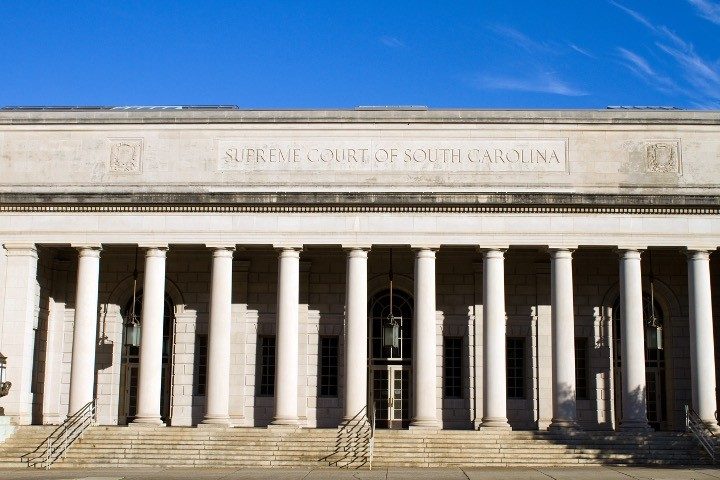
In a 3-2 decision, the South Carolina Supreme Court on Thursday ruled that a ban on abortion violates a state constitutional right to privacy. Under the law, signed by Governor Henry McMaster almost two years ago, abortions were banned in cases in which cardiac activity is detected — with exceptions for rape, incest, or if the mother’s life is in danger.
Justice Kaye Hearn opined that while the state “unquestionably” has the authority to limit the right to privacy, as she put it, any such limitation must allow a woman enough time to “determine [she] is pregnant and take reasonable steps” if she decides to abort her unborn child. “Six weeks is, quite simply, not a reasonable period of time for these two things to occur,” she said.
Not surprisingly, White House spokesperson Karine Jean-Pierre took to Twitter to praise the ruling that blocked what she called “the state’s extreme and dangerous abortion ban. Women should be able to make their own decisions about their bodies.”
After the U.S. Supreme Court’s decision in Dobbs v. Jackson Women’s Health Organization last year — which overturned the 1973 Roe v. Wade ruling that created a “right” to an abortion, at least in many cases — attention shifted to the states. Some states have opted to keep the status quo concerning their abortion laws, others have chosen to enact laws declaring a woman has a “right” to have an abortion, and still others, like South Carolina, have further restricted instances in which abortion is legal.
However, state legislatures are not the only battleground in the contentious issue. It is expected that some other state supreme courts will intervene and “find” a right to abortion in their own state constitutions. South Carolina’s high court is the first to do so, and there will no doubt be more, because the pro-abortion movement is certainly not going to give up their quest to have abortion legal in every state.
Alexis McGill Johnson, president of Planned Parenthood Federation of America, said as much following the ruling. “Planned Parenthood will keep working day by day and state by state to safeguard that right for all people.” Lawyers for Planned Parenthood have argued that the “right to privacy” protects the right to abortion in the states regardless of what a state’s legislature does.
Two of the five Supreme Court justices in South Carolina dissented. Justice George James, Jr. argued that the right to privacy protects only against searches and seizures, not a woman’s right to terminate a pregnancy, and, in a separate dissent, Justice John Kittredge warned against letting the judicial branch resolve what he said is a “policy dispute.”
“Our legislature has made a policy determination regulating abortions in South Carolina. The legislative policy determination, as contained in the Act, gives priority to protecting the life of the unborn,” Kittredge wrote.
South Carolina Republicans, led by the governor, promised to push for more restrictions on abortion despite Thursday’s ruling. “With this opinion, the Court has clearly exceeded its authority,” McMaster said in a statement. “The people have spoken through their elected representatives multiple times on this issue. I look forward to working with the General Assembly to correct this error.”
House Speaker G. Murrell Smith, Jr., a Republican, tweeted that the state justices created “a constitutional right to an abortion where none exists.”
The situation in South Carolina well illustrates that the abortion question was not settled by Dobbs any more than it was settled by Roe. Pro-abortion zealots will continue to push for fewer restrictions on abortion, while pro-life activists will continue to advocate for more restrictions.
Before the Dobbs decision, one faction of those opposing abortion argued that state legislatures should simply defy the Supreme Court’s Roe decision and subsequent rulings asserting a constitutional right to abortion. However, it was never that simple. Even were a state legislature to place restrictions on abortion, or even ban the practice outright, the state judiciaries would likely favor progressives. This is because judges are picked from the legal profession, largely trained in law schools that support progressive causes — including abortion.
Even in states with pro-life majorities in their legislative bodies, it can be safely predicted that judges on many state appellate courts would attempt to block efforts to increase restrictions on abortion.
Then there is Congress, where pro-abortion advocates have called for creating a federal protection for abortion by statute. Clearly, Congress has no such constitutional authority to do so, as one can search in vain for an enumerated power of Congress to enact laws of this type. But, with the recent passage of a “law” to protect same-sex marriage in every state — despite marriage laws being clearly one of the multiple powers reserved to the states under the 10th Amendment to the Constitution (and by the very nature of the federal system of government created by the Constitution), it is obvious that this passage of a federal protection to the right to an abortion is a real possibility at some time in the future.
Bluntly put, few members of Congress take their oaths to follow the U.S. Constitution very seriously.
This means that those who favor protecting the lives of unborn children must be prepared to continue the fight into the future. Some of those battles will take place in Congress, others in state legislatures, and others, as the example of South Carolina demonstrates, in state courts.
Finally, this battle must take place in the court of public opinion. Those who believe in the right to life — and in following the Constitution — must be prepared to educate their fellow citizens on both.



